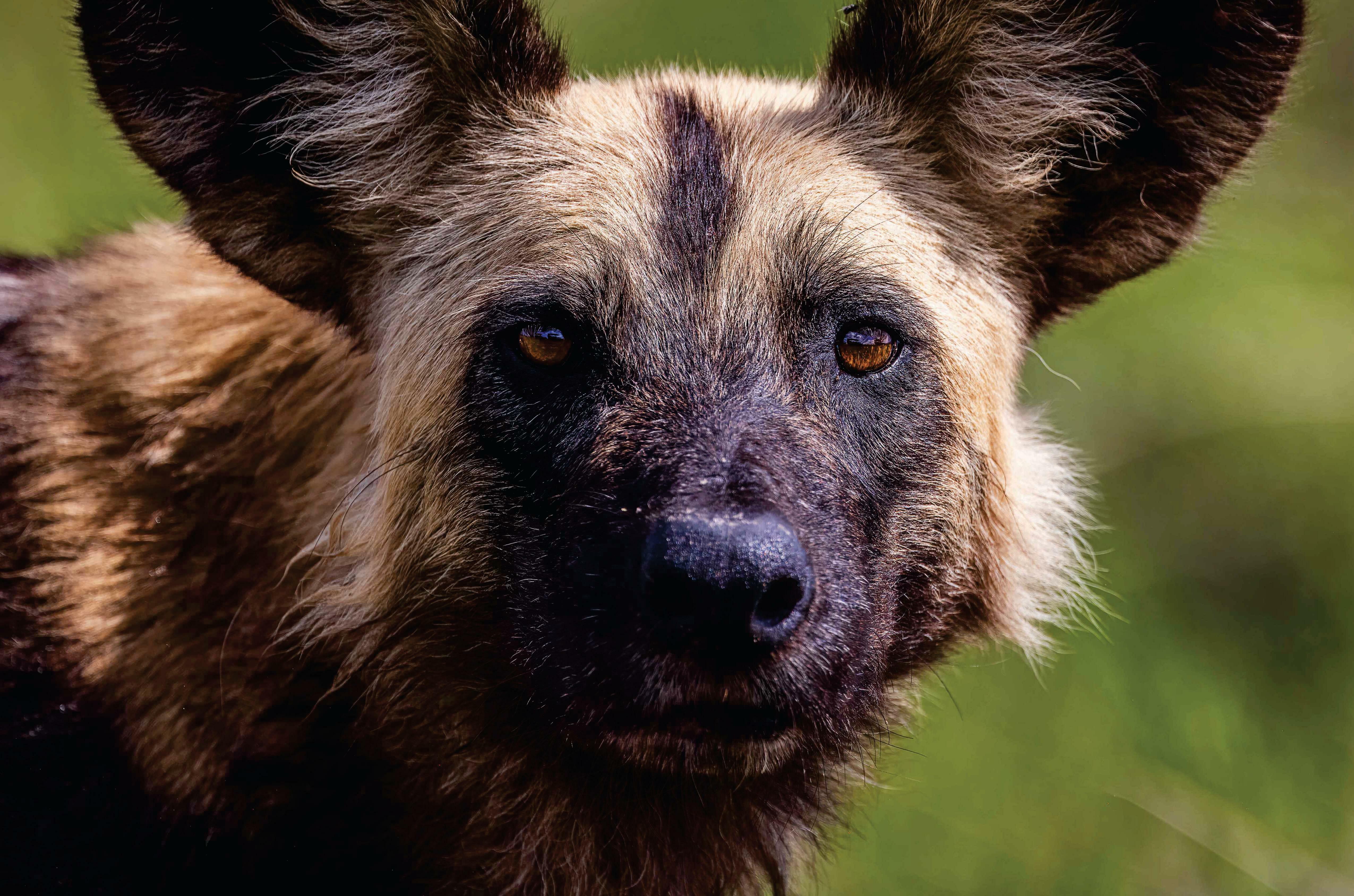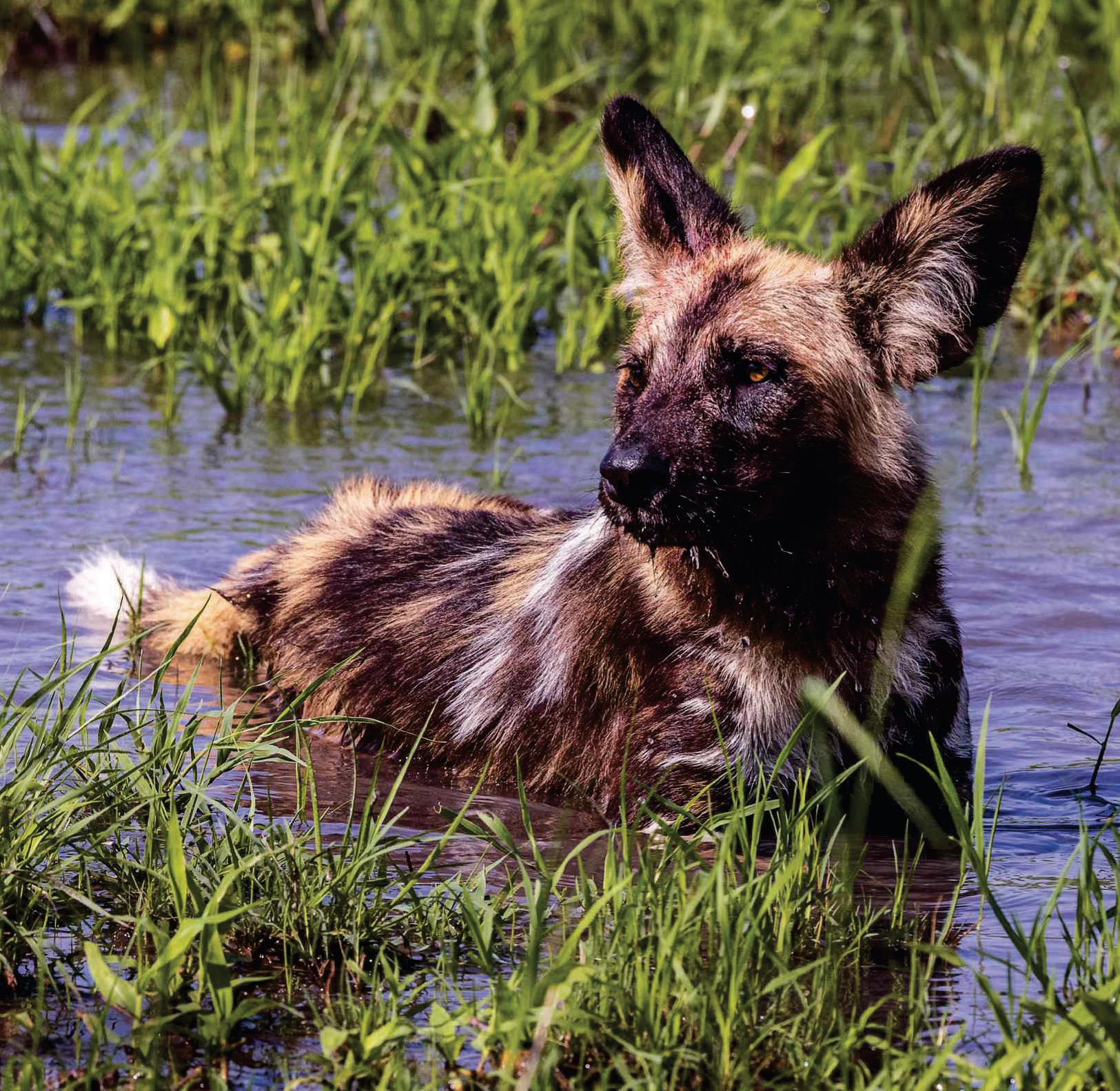Try GOLD - Free
DOG STARS
BBC Wildlife
|September 2025
Rare and elusive, African wild dogs have incredible hunting abilities and display group dynamics we could learn a lot from

THE LION TRACKS ARE FRESH. Though I'm only an amateur, even I know this because they're sharp, each ghostly step a cleanly defined imprint on sand pitted by last night's rain. Paco Morapedi, my guide, peers over the side of the car, uncertain. “They were moving around a lot, back and forth. It's hard to follow where they went.” It's a sparkling morning in Botswana's Moremi Game Reserve, a huge haven of open grasslands, floodplains currently waterlogged from seasonal rainfall, and perfumed forests where rutted Jeep tracks wind between mature ebony and mopane trees.
We're following the confusion of pawprints more in hope than expectation, pausing occasionally to observe a pair of iridescent Burchell's starlings flashing turquoise in the sunlight, or a yellow-billed stork motionless by a pond, when the radio crackles into life. Another guide has found something even better: African wild dogs.
 Priorities immediately updated, Paco throws the Land Cruiser into gear and we speed towards the sighting, surfing over puddles as fast as the muddy road will allow.
Priorities immediately updated, Paco throws the Land Cruiser into gear and we speed towards the sighting, surfing over puddles as fast as the muddy road will allow.African wild dogs, also known as painted dogs, painted wolves or Cape hunting dogs, are notoriously hard to find. Listed as Endangered on the IUCN Red List, there are fewer than 6,000 left in Africa, with up to only 800 in Botswana, their numbers decimated by the four apocalyptic horsemen of habitat fragmentation, human-wildlife conflict, diseases caught from domestic dogs, and shrinking territories forcing them to compete with larger predators such as lions.
This story is from the September 2025 edition of BBC Wildlife.
Subscribe to Magzter GOLD to access thousands of curated premium stories, and 10,000+ magazines and newspapers.
Already a subscriber? Sign In
MORE STORIES FROM BBC Wildlife

BBC Wildlife
"I was terrified the elephant would ram us"
African elephant in Kenya
2 mins
January 2026

BBC Wildlife
ALL YOU EVER NEEDED TO KNOW ABOUT THE Fennec fox
THE FENNEC FOX IS THE SMALLEST fox in the world, with a body length that can be as little as 24cm.
3 mins
January 2026

BBC Wildlife
INTO THE PLASTISPHERE
A unique synthetic ecosystem is evolving in our oceans – welcome to the plastisphere
7 mins
January 2026

BBC Wildlife
“More than half of all animal life exists in a parasitic relationship, and all life lives in symbiosis”
Our survival depends on species evolving to live together - but some relationships take dark turns
7 mins
January 2026

BBC Wildlife
Are animals able to dream?
SLEEP IS A MYSTERIOUS THING. FOR A long time, we weren't sure why we do it.
1 mins
January 2026

BBC Wildlife
Does a cuckoo know it's a cuckoo?
ABSURD LITTLE BIRDS ACROSS THE world lay their eggs in the nests of other species, leaving the hapless parents to raise a changeling at the expense of their own offspring.
2 mins
January 2026

BBC Wildlife
Orcas killing young sharks
Juvenile great whites are easy prey for orca pod
1 mins
January 2026

BBC Wildlife
Ocean goes on tour
Acclaimed film touring the UK, backed by live orchestra and choir
1 min
January 2026

BBC Wildlife
Feisty bats hunt like lions
Winged mammals use a 'hang and wait' strategy to take down large prey
1 mins
January 2026

BBC Wildlife
SNAP-CHAT
Richard Birchett on magical merlins, wily coyotes and charging deer
2 mins
January 2026
Listen
Translate
Change font size
